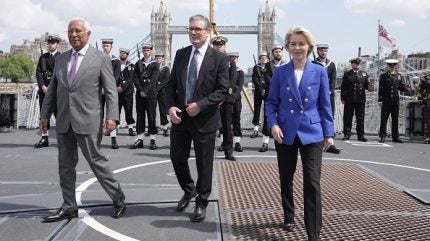
The UK has agreed a deal with the EU to simplify the cross-border trade of food and drinks and extend reciprocal fishing access.
A new agreement on sanitary and phytosanitary measures (SPS) – checks for diseases, pests, or contaminants – will facilitate food and drink products to be traded between the UK and EU and reduce the “red tape” London says burdens businesses and leads to lorry queues at the border.

Discover B2B Marketing That Performs
Combine business intelligence and editorial excellence to reach engaged professionals across 36 leading media platforms.
Food and drink traders have faced lengthy procedures to get their products across the Channel in either direction since the UK left the EU in 2020.
“Some routine checks on animal and plant products will be removed completely, allowing goods to flow freely again, including between Great Britain and Northern Ireland. Ultimately this could lower food prices and increase choice on supermarket shelves,” the UK government said.
The European Commission said the agreement would require the UK to align to “the relevant EU rules”.
The UK government said the EU is its largest trading partner and the deal means UK products such as burgers and sausages could now be sold more easily in the EU. Since the UK left the EU, the country’s exports to the bloc have fallen 21% and imports from the EU have dropped 7%.

US Tariffs are shifting - will you react or anticipate?
Don’t let policy changes catch you off guard. Stay proactive with real-time data and expert analysis.
By GlobalDataResearch by Aston University published in September found the agri-food sector to be one of the hardest hit from a drop-off in UK imports and exports following Brexit.
Negotiators also came to an agreement on fishing access, guaranteeing an extension of 12 years for “full reciprocal access to waters”, the Commission said.
A post-Brexit fishing deal was set to expire on 30 June 2026 but has now been extended until 30 June 2038.
The UK government said the deal “protects Britain’s fishing access, fishing rights and fishing areas with no increase in the amount of fish EU vessels can catch in British waters, providing stability and certainty for the sector”.
European Commission president Ursula von der Leyen described the agreement as “a new chapter” in the “unique relationship” between the UK and the EU.
She said the deal on agri-food products “means more certainty and more stability for our farmers, food producers and fishermen and fisherwomen on both sides of the Channel”.
Von der Leyen added: “In addition, we have reached an agreement on fisheries, ensuring reciprocal access to waters until 2038. This is so important for long-term stability and predictability.”
Karen Betts, chief executive of UK industry body The Food and Drink Federation (FDF), said: “Trade with the EU is incredibly important to UK food and drink manufacturers. Europe is our single biggest customer and most of the food and drink we import – from ingredients to finished products – comes from Europe, too. However, trade in both directions has become complex and challenging.
“We’re pleased to see today’s announcement of a much closer UK-EU trading relationship, which acknowledges our shared high standards in food and drink. A high-quality agreement will have clear benefits for consumers and businesses.”
The British Meat Processors Association said the deal “promises to bring back all the trade that simply ceased after Brexit due to crippling red tape and tens of millions of extra costs”.
It added that complying with other countries’ standards is normal in international trade. “A common misunderstanding is that an SPS agreement will mean Britain becomes a ‘rule taker’. In reality, we must comply with the rules of any of our trading partners if we want to export to them – just like America must comply with British rules if they want to send us their products. This means we have been aligned with EU rules and standards all along.”
But the UK’s National Federation of Fishermen’s Organisations expressed its disappointment at the deal. “This surrenders the best prospect that the fishing industry and coastal communities had for growth over the coming decade. We had reason to believe that our government understood the economic, symbolic and conservation value of reclaiming exclusive access for UK boats to our territorial waters within 12 miles of the coast. Clearly, however, they did not value such things as much as their European counterparts.”
The Fresh Produce Consortium, meanwhile, called on the UK government to establish clear timelines for implementation and to create safeguards for non-EU trade which is not covered by the deal.





